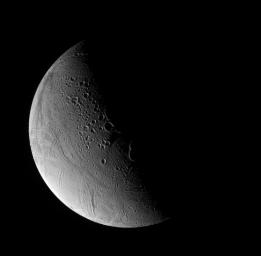Half-lit Enceladus
Caption:
A world whose mysteries are just coming to light, Enceladus has enchanted scientists and non-scientists alike. With its potential for near-surface liquid water, the icy moon may be the latest addition to the list of possible abodes for life.
The view was acquired about two-and-a-half hours after
PIA08280
, during an encounter with Enceladus (505 kilometers, or 314 miles across).
The image was taken using a combination of spectral filters sensitive to wavelengths of polarized ultraviolet light. The Cassini spacecraft narrow-angle camera acquired the view on Sept. 9, 2006 at a distance of approximately 141,000 kilometers (877,000 miles) from Enceladus and at a Sun-Enceladus-spacecraft, or phase, angle of 96 degrees. Image scale is 850 meters (0.5 mile) per pixel.
Background Info:
The Cassini-Huygens mission is a cooperative project of NASA, the European Space Agency and the Italian Space Agency. The Jet Propulsion Laboratory, a division of the California Institute of Technology in Pasadena, manages the mission for NASA's Science Mission Directorate, Washington, D.C. The Cassini orbiter and its two onboard cameras were designed, developed and assembled at JPL. The imaging operations center is based at the Space Science Institute in Boulder, Colo.
For more information about the Cassini-Huygens mission visit
http://saturn.jpl.nasa.gov/home/index.cfm
. The Cassini imaging team homepage is at
http://ciclops.org
.
Cataloging Keywords:
| Name |
Value |
Additional Values |
| Target |
Enceladus |
|
| System |
Saturn |
|
| Target Type |
Satellite |
|
| Mission |
Cassini-Huygens |
|
| Instrument Host |
Cassini Orbiter |
|
| Host Type |
Orbiter |
|
| Instrument |
Imaging Science Subsystem (ISS) |
|
| Detector |
Narrow Angle Camera |
|
| Extra Keywords |
Grayscale, Ultraviolet, Visual, Water |
| Acquisition Date |
|
| Release Date |
2006-10-12 |
| Date in Caption |
|
|
| Image Credit |
NASA/JPL/Space Science Institute |
| Source |
photojournal.jpl.nasa.gov/catalog/PIA08286 |
| Identifier |
PIA08286 |

 Planetary Data System
Planetary Data System
